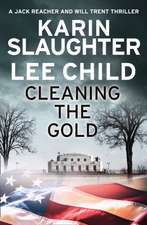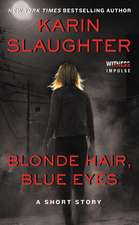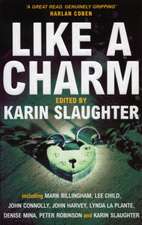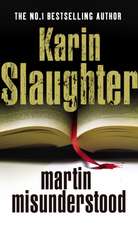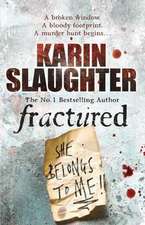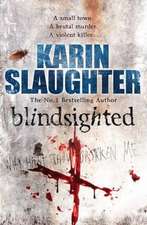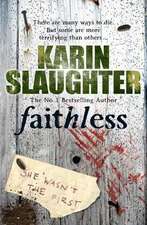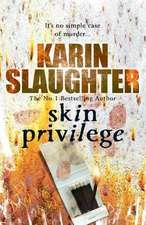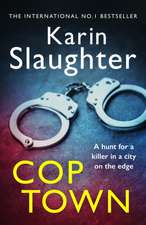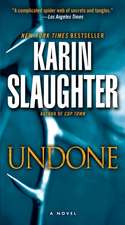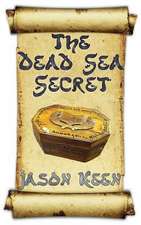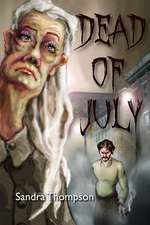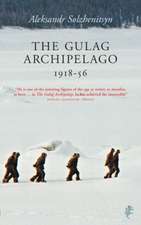Fallen
Autor Karin Slaughteren Limba Engleză Paperback – 15 oct 2012
“A complex, gripping and deadly serious novel that reflects anew Slaughter's abundant talent.”—The Washington Post
“An amazing effort . . . This is [Karin] Slaughter’s best book to date, and readers unfamiliar with her work will find this one a perfect place to begin.”—Associated Press
There’s no police training stronger than a cop’s instinct. Faith Mitchell’s mother isn’t answering her phone. Her front door is open. There’s a bloodstain above the knob. Everything Faith learned in the academy goes out the window when she charges into her mother’s house, gun drawn. She sees a man dead in the laundry room, a hostage situation in the bedroom. What she doesn’t see is her mother. When the hostage situation turns deadly, Faith is left with too many questions. She’ll need the help of her partner, Will Trent, and trauma doctor Sara Linton to get some answers. But Faith isn’t just a cop anymore, she’s a witness—and a suspect. To find her mother, Faith will have to cross the thin blue line and bring the truth to light—or bury it forever.
“An absolute master . . . Slaughter creates some wonderfully complex and mature female characters, a distinctive achievement in the world of thrillers.”—Chicago Tribune
“Slaughter has always known how to pace the suspense in her stellar crime novels, but she really outdoes herself here. . . . [She] reveals the heart and soul of her characters within a highly choreographed, unrelentingly suspenseful plot.”—Booklist (starred review)
| Toate formatele și edițiile | Preț | Express |
|---|---|---|
| Paperback (3) | 55.88 lei 23-34 zile | +23.66 lei 6-10 zile |
| Random House – 21 iun 2012 | 55.88 lei 23-34 zile | +23.66 lei 6-10 zile |
| dell – | 59.76 lei 3-5 săpt. | |
| Bantam – 15 oct 2012 | 130.38 lei 3-5 săpt. |
Preț: 130.38 lei
Nou
24.95€ • 25.78$ • 20.77£
Carte disponibilă
Livrare economică 05-19 martie
Specificații
ISBN-10: 0345540859
Pagini: 407
Dimensiuni: 132 x 202 x 23 mm
Greutate: 0.31 kg
Editura: Bantam
Notă biografică
Extras
CHAPTER ONE
Faith Mitchell dumped the contents of her purse onto the passenger seat of her Mini, trying to find something to eat. Except for a furry piece of gum and a peanut of dubious origin, there was nothing remotely edible. She thought about the box of nutrition bars in her kitchen pantry, and her stomach made a noise that sounded like a rusty hinge groaning open.
The computer seminar she’d attended this morning was supposed to last three hours, but that had stretched into four and a half thanks to the jackass ion the front row who kept asking pointless questions. The Georgia Bureau of Investigation trained its agents more often than any other agency in the region. Statistics and data on criminal activities were constantly being drummed into their heads. They had to be up -to -date on all of the latest technology. They had to qualify at the range twice a year. They ran mock raids and active shooter simulations that were so intense that for weeks after, Faith couldn’t go to the bathroom in the middle of the night without checking shadows in doorways. Usually, she appreciated the agency’s thoroughness. Today, all she could think about was her four-month- old baby, and the promise Faith had made to her mother that she would be back no later than noon.
The clock on the dash read ten after one o’clock when she started the car. Faith mumbled a curse as she pulled out of the parking lot in front of the Panthersville Road headquarters. She used Bluetooth to dial her mother’s number. The car speakers gave back a static-y silence. Faith hung up and dialed again. This time, she got a busy signal.
Faith tapped her finger on the steering wheel as she listened to the bleating. Her mother had voicemail. Everybody had voicemail. Faith couldn’t remember the last time she’d heard a busy signal on the telephone. She had almost forgotten the sound. There was probably a crossed wire somewhere at the phone company. She hung up and tried the number a third time.
Still busy.
Faith steered with one hand as she checked her Blackberry for an email from her mother. Before Evelyn Mitchell retired, she had been a cop for just shy of four decades. You could say a lot about the Atlanta force, but you couldn’t claim they were behind the times. Evelyn had carried a cell phone back when they were more like purses you strapped around your shoulder. She’d learned how to use email before her daughter had. She’d carried a Blackberry BlackBerry for almost fifteen years.
But, she hadn’t sent a message today.
Faith checked her cell phone voicemail. She had a saved message from her dentist’s office about making an appointment to get her teeth cleaned, but there was nothing new. She tried her phone at home, thinking maybe her mother had gone there to pick up something for the baby. Faith’s house was just down the road from Evelyn’s. Maybe Emma had run out of diapers. Maybe she’d needed another bottle. Faith listened to the phone ring at her house, then heard her own voice answer, telling callers to leave a message.
She ended the call. Without thinking, she glanced into the back seat. Emma’s empty car seat was there. She could see the pink liner sticking out over the top of the plastic.
“Idiot,” Faith whispered to herself. She dialed her mother’s cell phone number. She held her breath as she counted through three rings. Evelyn’s voicemail picked up.
Faith had to clear her throat before she could speak. She was aware of a tremor in her tone. “Mom, I’m on my way home. I guess you took Em for a walk …” . . .” Faith looked up at the sky as she merged onto the interstate. She was about twenty minutes outside of Atlanta and could see fluffy white clouds draped like scarves around the skinny necks of skyscrapers. “Just call me,” Faith said, worry needling the edge of her brain.
Grocery store. Gas station. Pharmacy. Her mother had a car seat identical to the one in the back of Faith’s car. She was probably out running errands. Faith was over an hour late. Evelyn would’ve taken the baby and … . . . Left Faith a message that she was going to be out. The woman had been on call for the majority of her adult life. She didn’t go to the toilet without letting someone know. Faith and her older brother, Zeke, had joked about it when they were kids. They always knew where their mother was, even when they didn’t want to. Especially when they didn’t want to.
Faith stared at the phone in her hand as if it could tell her what was going on. She was aware that she might be letting herself get worked up over nothing. The landline could be out. Her mother wouldn’t know this unless she tried to make a call. Her cell phone could be switched off or charging or both. Her Blackberry BlackBerry could be in her car or her purse or somewhere she couldn’t hear the tell-telltale vibration. Faith glanced back and forth between the road and her Blackberry BlackBerry as she typed an email to her mother. She spoke the words aloud as she typed—
“On-my-way. Sorry-I’m-late. Call-me.”
She sent the email, then tossed the phone onto the seat along with the spilled items from her purse. After a moment’s hesitation, Faith popped the gum into her mouth. She chewed as she drove, ignoring the purse lint clinging to her tongue. She turned on the radio, then snapped it back off. The traffic thinned as she got closer to the city. The clouds moved apart, sending down bright rays of sunshine. The inside of the car began to bake.
Ten minutes out, Faith’s nerves were still one edge, and she was sweating from the heat in the car. She cracked the sunroof to let in some air. This was probably a simple case of separation anxiety. She’d been back at work for a little over two months, but still, every morning when Faith left Emma at her mother’s, she felt something akin to a seizure take hold. Her vision blurred. Her heart shook in her chest. Her head buzzed as if a million bees had flown into her ears. She was more irritable than usual at work, especially with her partner, Will Trent, who either had the patience of Job or was setting up a believable alibi for when he finally snapped and strangled her.
Faith couldn’t recall if she had felt this same anxiety with Jeremy, her son, who was now a freshman in college. Faith had been eighteen when she entered the police academy. Jeremy was three years old by then. She had grabbed onto the idea of joining the force as if it was the only life preserver left on the Titanic. Thanks to two minutes of poor judgment in the back of a movie theater and what foreshadowed a lifetime of breathtakingly bad taste in men, Faith had gone straight from puberty to motherhood without any of the usual stops in between. At eighteen, she had relished the idea of earning a steady paycheck so that she could move out of her parents’ house and raise Jeremy the way that she wanted. Going to work every day had been a step toward independence. Leaving him during the day had seemed like a small price to pay.
Now that Faith was thirty-four, with a mortgage, a car payment, and another baby to raise on her own, she wanted nothing more than to move back into her mother’s house so that Evelyn could take care of everything. She wanted to open the refrigerator and see food that she didn’t have to buy. She wanted to turn on the air conditioner in the summer without worrying about having to pay the bill. She wanted to sleep until noon, and then watch TV all day. Hell, while she was at it, she might as well resurrect her father, who’d died eleven years ago, so that he could make her pancakes at breakfast and tell her how pretty she was.
No chance of that now. Evelyn seemed happy to play the role of nanny in her retirement, but Faith was under no illusion that her life was going to get any easier. Her own retirement was almost twenty years away. The Mini had another three years of payments and would be out of warranty well before that. Emma would expect food and clothing for at least the next eighteen years, if not more. And it wasn’t like when Jeremy was a baby and Faith could dress him in mismatched socks and yard sale hand-me-downs. Babies today had to coordinate. They needed BPA-free bottles and certified organic applesauce from kindly Amish farmers. If Jeremy got into the architectural program at Georgia Tech, Faith was looking at six more years of buying books and doing his laundry. Most worryingly, her son had found a serious girlfriend. An older girlfriend with curvy hips and a ticking biological clock. Faith could be a grandmother before she turned thirty-five.
An unwelcome heat rushed through her body as she tried to push this last thought from her mind. She checked the contents of her purse again as she drove. The gum hadn’t made a dent. Her stomach was still growling. She reached over and felt around inside the glovebox. Nothing. She should stop at a fast- food place and at least get a Coke, but she was wearing her regs—tan khakis and a blue shirt with the letters GBI emblazoned in bright yellow on the back. This wasn’t the best part of town to be in if you were law enforcement. People tended to run, and then you had to chase them, which wasn’t conducive to getting home at a reasonable hour. Besides, something was telling her—urging her—to see her mother.
Faith picked up her phone and dialed Evelyn’s numbers again. Home, cell, even her BlackberryBlackBerry, which she only used for email. All three brought the same negative response. Faith could feel her stomach flip as the worst scenarios ran through her mind. As a beat cop, she’d been called out onto a lot of scenes where a crying child had alerted the neighbors to a serious problem. Mothers had slipped in the tub. Fathers had accidentally injured themselves or gone into coronary arrest. The babies had lain there, wailing helplessly, until someone had figured out that something was wrong. There was nothing more heart -wrenching than a crying baby who could not be soothed.
Faith chided herself for bringing these horrible images to mind. She had always been good at assuming the worst, even before she became a cop. Evelyn was probably fine. Emma’s naptime was at one-thirty. Her mother had probably turned off the phone so the ringing wouldn’t wake the baby. Maybe she’d run into a neighbor while checking the mailbox, or gone next door to help old Mrs. Levy’s take out the trash.
Still, Faith’s hands slipped on the wheel as she exited onto Boulevard. She was sweating despite the mild March weather. This couldn’t just be about the baby or her mother or even Jeremy’s unconscionably fertile girlfriend. Faith had been diagnosed with diabetes less than a year ago. She was religious about measuring her blood sugar, eating the right things, making sure she had snacks on hand. Except for today. That probably explained why her thinking had gone sideways. She just needed to eat something. Preferably in view of her mother and child.
Faith checked the glovebox again time to make sure it was really empty. She had a distant memory of giving Will her last nutrition bar yesterday while they were waiting outside the courthouse. It was that or watch him inhale a sticky bun from the vending machine. He had complained about the taste but eaten the whole bar anyway. And now she was paying for it.
She blew through a yellow light, speeding as much as she dared down a semi-residential street. The road narrowed at Ponce de Leon. Faith passed a row of fast- food restaurants and an organic grocery store. She edged up the speedometer, accelerating into the twists and turns bordering Piedmont Park. The flash of a traffic camera bounced off her rear-view mirror as she sailed through another yellow light. She tapped on the brakes for a straggling jaywalker. Two more grocery stores blurred by, then came the final red light, which was mercifully green.
Evelyn still lived in the same house Faith and her older brother had grown up in. The single-story ranch was located in an area of Atlanta called Sherwood Forest, which was nestled between Ansley Park, one of the wealthiest neighborhoods in the city, and interstate Interstate eighty-five85, which offered a the more or less constant roar of traffic, depending on which way the wind was blowing. The wind was blowing just fine today, and when Faith rolled down her window to let in more fresh air, she heard the familiar hum that had marked most every day of her childhood.
As a lifelong resident of Sherwood Forest, Faith had a deep-seated hatred for the men who had planned the neighborhood. The subdivision had been developed after World War II, the brick ranch houses filled by returning soldiers who took advantage of low VA loans. The street planners had unabashedly embraced the Sherwood concept. After taking a hard left onto Lionel, Faith crossed Friar Tuck, took a right on Robin Hood Road, coasted through the fork at Lady Marian Lane, and checked the driveway of her own house on the corner of Doncaster and Barnesdale before finally pulling into her mother’s driveway off Little John Trail.
Evelyn’s beige Chevy Malibu was backed into the carport. That, at least, was normal. Faith had never seen her mother pull nose-first into a parking space. It came from her days in uniform. You always made sure your car was ready to leave as soon as a call came in.
Faith didn’t have time to reflect on her mother’s routines. She rolled into the driveway and parked the Mini nose-to-nose with the Malibu. Her legs ached as she stood; every muscle in her body had been tensed for the last twenty minutes. She could hear loud music blaring from the house. Heavy metal, not her mother’s usual Beatles. Faith put her hand on the hood of the Malibu as she walked toward the kitchen door. The engine was cold. Maybe Evelyn had been in the shower when Faith called. Maybe she hadn’t checked her email or cell phone. Maybe she had cut herself. There was a bloody handprint on the door.
Faith felt herself do a double -take.
The bloody print showed a left hand. It was about eighteen inches above the knob. The door had been pulled closed but hadn’t latched. A streak of sunlight cut through the jam, probably from the window over the kitchen sink.
Faith still couldn’t process what she was seeing. She held up her own hand to the print, a child pressing her fingers to her mother’s. Evelyn’s hand was smaller. Slender fingers. The tip of her ring finger hadn’t touched the door. There was a clot of blood where it should have been.
Suddenly, the music stopped mid-thump. In the silence, Faith heard a familiar gurgling noise, a revving up that announced the coming of a full-on wail. The sound echoed in the carport, so that for a moment, Faith thought it was coming from her own mouth. Then it came again, and she turned around, knowing that it was Emma.
Unlike mAlmost every other house in Sherwood Forest that had been razed or remodeled, but the Mitchell home was much the same as when it had first been built. The layout was simple: three bedrooms, a family room, a dining room, and a kitchen with a door leading to the open carport. Bill Mitchell, Faith’s father, had built a tool shed on the opposite side of the carport. It was a sturdy building—her father had never done anything halfway—with a metal door that bolted shut and safety glass in its one window. Faith was ten before she realized that the building was too fortified for something as simple as tool storage. With the tenderness that only an older brother can muster, Zeke had filled her in on the shed’s true purpose. “It’s where mom Mom keeps her gun, you dumbass.”
Faith ran past the car and tried to open the shed door. It was locked. She looked through the window. The metal wires in the safety glass formed a spider web in front of her eyes. She could see the potting table and bags of soil stacked neatly underneath. Tools hung on their proper hooks. Lawn equipment was stowed neatly in place. A black metal safe with a combination lock was bolted to the floor under the table. The door was open. Evelyn’s cherry- handled Smith and Wesson revolver was missing. So was the carton of ammunition that was usually beside it.
The gurgling noise came again, louder this time. A pile of blankets on the floor pulsed up and down like a heartbeat. Evelyn used them to cover her plants during unexpected freezes. They were usually folded on the top shelf but now were wadded up in the corner beside the safe. Faith saw a tuft of pink sticking up behind the gray blankets, then the bend of a plastic headrest that could only be Emma’s car seat. The blanket moved again. A tiny foot kicked out; a soft yellow cotton sock with white lace trim around the ankle. Then a little pink fist punched through. Then she saw Emma’s face.
Emma smiled at Faith, her top lip forming a soft triangle. She gurgled again, this time with delight.
“Oh, God.” Faith uselessly pulled at the locked door. Her hands shook as she felt around the top edge of the jam, trying to find the key. Dust rained down. The sharp point of a splinter dug into her finger. Faith looked in the window again. Emma clapped her hands together, soothed by the sight of her mother, despite the fact that Faith was as close to a full-on panic as she had ever been in her life. The shed was hot. It was too warm outside. She Emma could overheat. She could become dehydrated. She could die.
Panicked, Faith got down on her hands and knees, thinking the key had fallen, possibly slid back under the door. She saw the bottom of Emma’s car seat was bent where it had been wedged between the safe and the wall. Hidden behind the blankets. Blocked by the safe.
Protected by the safe.
Faith stopped. Her lungs tightened mid-breath. Her jaw tensed as if it had been wired shut. Slowly, she sat up. There were drops of blood on the concrete in front of her. Her eyes followed the trail going to the kitchen door. To the bloody handprint.
Emma was locked in the shed. Evelyn’s gun was missing. There was a blood trail to the house.
Faith stood, facing the unlatched kitchen door. There was no sound but her own labored breath.
Who had turned off the music?
Faith jogged back to her car. She took her Glock from under the driver’s seat. She checked the magazine and clipped the holster to her side. Her phone was still on the front seat. Faith grabbed it before popping open the trunk. She had been a detective with the Atlanta homicide squad before becoming a special agent with the state. Her fingers dialed the unlisted emergency line from memory. She didn’t give the dispatcher time to speak. She rattled off her old badge number, her unit, and her mother’s street address.
Faith paused before saying, “code Code thirtythirty.” The words nearly choked her. Code thirty30. She had never used the phrase in her life. It meant that an officer needed emergency assistance. It meant that a fellow cop was in serious danger, possibly dead. “My child is locked in the shed outside. There’s blood on the concrete and a bloody handprint on the kitchen door. I think my mother is inside the house. I heard music, but it was turned off. She’s retired Blue. I think she’s—” Faith’s throat tightened like a fist. “Help. Please. Send help.”
“Acknowledge code code thirtythirty,” the dispatcher answered, her tone sharp and tense. “Stay outside and wait for back-up. Do not—repeat—do not go into the house.”
“Acknowledged.” Faith ended the call and tossed the phone into the back seat. She twisted her key into the lock that kept her shotgun bolted to the trunk of her car.
The GBI issued every agent at least two weapons. The Glock model 23 was a forty.40-caliber semi-automatic that held thirteen rounds in the magazine and one in the chamber. The Remington 870 held four rounds of double- ought buckshot. Faith’s shotgun carried six extra rounds in the side-saddle attached in front of the stock. Each round contained eight pellets. Each pellet was about the size of a thirty-eight.38- caliber bullet.
Every pull of the trigger on the Glock shot one bullet. Every pull on the Remington shot eight.
Agency policy dictated that all agents keep a round chambered in their Glocks, giving them fourteen rounds total. There was no conventional safety on the weapon. Agents were authorized by law to use deadly force if they felt their lives or the lives of others were in danger. You only pulled back on the trigger when you meant to shoot, and you only shot when you meant to kill.
The shotgun was a different story with the same ending. The safety was to the rear of the trigger guard, a cross- bolt slide that took some muscle to move. You didn’t keep a round in the chamber. You wanted everybody around you to hear that round racking, setting up to blast. Faith had seen grown men drop to their knees at the sound.
She looked back at the house as she disengaged the safety. The curtain on the front window twitched. A shadow ran down the hallway.
Faith pumped the shotgun with one hand as she walked toward the carport. The action made a satisfying tha-thunk that echoed against the concrete. In a single fluid motion, the stock was against her shoulder, the barrel straight in front of her. She kicked open the door, holding the weapon steady as she yelled, “Police!”
The word boomed through the house like a clash of thunder. It came from a deep, dark place in Faith’s gut that she ignored most of the time for fear of switching something on that could never be shut off.
“Come out with your hands in the air!”
No one came out. She heard a noise from somewhere in the back of the house. Her vision sharpened as she entered the kitchen. Blood on the counter. A bread knife. More blood on the floor. Drawers and cabinets gaping open. The phone on the wall hung like a twisted noose. Evelyn’s Blackberry BlackBerry and cell phone were smashed to pieces on the floor. Faith kept the shotgun in front of her, finger resting just to the side of the trigger so that she didn’t make any mistakes.
She should’ve been thinking about her mother, or Emma, but there were only two wordswas only one phrase that kept going through her mind: people and doorways. When you cleared a house, those these were the biggest threats to your safety. You had to know where the people were—whether they were good guys or not—and you had to know what was coming at you from every door.
Faith pivoted to the side, pointing the shotgun into the laundry room. She saw a man lying face-down on the floor. Black hair. Skin a yellow wax. His arms wrapped around his body like a child playing a spinning game. No gun on or near him. The back of his head was a bloody pulp. Brain matter speckled the washing machine. She could see the hole the bullet dug into the wall when it exited his skull.
Faith pivoted back to the kitchen. There was a pass-through to the dining room. She crouched and swung around.
Empty.
The layout of the house came to her like a diagram in her head. Family room on her left. Large, open foyer on the right. Hall straight ahead. Bathroom at the end. Two bedrooms on the right. One bedroom on the left—her mother’s room. Inside was a tiny bathroom, a door that led to the back patio. Evelyn’s bedroom door was the only one in the hall that was closed.
Faith started to go toward the closed door, but stopped.
People and doorways.
Her mind saw the words engraved in stone: do Do not engage your downward threat until you are sure everything behind you is clear.
Faith crouched as she turned left, entering the family room. She scanned along the walls, checked the sliding glass door that led into the back yard. The glass was shattered. A breeze rustled the curtains. The room had been ransacked. Someone was looking for something. Drawers were broken. Cushions gutted. From her vantage point, Faith could see behind the couch, that the wingback chair was clear of extra feet. She kept her head swiveling back and forth between the room and the hall until she was sure she could move on.
The first door was to her old bedroom. Someone had searched here, too. The drawers in her old bureau stuck out like tongues. The mattress was ripped open. Emma’s crib had been busted to pieces. Her blanket was ripped in two. The mobile that had hung above her head every month of her life had been ground into the carpet like a pile of dirt. Faith swallowed the burning rage this ignited inside of her. She forced herself to keep moving.
Quickly, she cleared the closets, under the bed. She did the same in Zeke’s room, which had been turned into her mother’s office. Papers were scattered on the floor. The desk drawers had been thrown against the wall. She glanced into the bathroom. The shower curtain was pulled back. The linen closet gaped open. Towels and sheets spilled onto the floor.
Faith was standing to the left of her mother’s bedroom door when she heard the first siren. It was distant, but clear. She should wait for it, wait for back-up.
Faith kicked open the door and swung around in a crouch. Her finger went to the trigger. Two men were at the foot of the bed. One was on his knees. He was Hispanic, dressed only in a pair of jeans. The skin across his chest was shredded as if he’d been whipped with barbed wire. Sweat glistened on every part of his body. Black and red bruises punched along his ribs. He had tattoos all over his arms and torso, the largest of which was on his chest: a green and red Texas star with a rattlesnake wrapped around it. He was a member Los Texicanos, a Mexican gang that had controlled the Atlanta drug trade for twenty years.
The second man was Asian. No tattoos. Bright red Hawaiian shirt and tan chinos. He held a gun to the Texicanos’ Texicano’s head. A cherry- handled Smith and Wesson five- shot. Her mother’s pistol.
Faith kept the shotgun trained on the Asian’s chest. The cold, hard metal felt like an extension of her body. Adrenaline had pumped her heart into a frenzy. Every muscle inside of her wanted to pull the trigger.
Her words were clipped. “Where’s my mother?”
He spoke in a twangy, southern drawl. “You shoot me, you’re gonna hit him.”
He was right. Faith was standing in the hallway, less than six feet away. The buckshot would spray, hitting, probably killing, both men. Still, she kept her finger on the trigger, the shotgun steady. “Tell me where she is.”
He pressed the muzzle harder against the man’s head. “Drop the gun.”
The sirens were getting louder. They were coming from zone Zone five5, on the Peachtree side of the neighborhood. Faith said, “You hear that sound?” She mapped their path down Nottingham, calculating the cruisers would be here in less than a minute. “Tell me where my mother is or I swear to God I’ll kill you before they hit the door.”
He smiled again, his hand tightening around the gun. “You know what we’re here for. Hand it over, and we’ll let her go.”
Faith didn’t know what the hell he was talking about. Her mother was a sixty-three- year-old widow. The most valuable thing in the house was the land they were standing on.
He took her silence for equivocation. “You really wanna lose your mommy over Chico here?”
Faith pretended to understand. “It’s that simple? You’ll trade?”
He shrugged. “Only way we’ll both walk outta here.”
“Bullshit.”
“No bullshit. Even trade.” The sirens got louder. Tires screeched in the street. “Come on, bitch. Tick-tock. Deal or no deal?”
He was lying. He’d already killed one person. He was threatening another. As soon as he figured out Faith was bluffing, the only thing he’d give her was a bullet in the chest.
“Deal,” she agreed, using her left hand to toss the shotgun out in front of her.
The firearms instructor at the shooting range carried a stopwatch that counted every tenth of a second, which was why Faith knew that it took her right hand exactly eight-tenths of a second to draw her Glock from her side holster. While the Asian was distracted by her shotgun dropping at his feet, she did just this, pulling the Glock, snaking her finger around the trigger, and shooting the man in the head.
His arms flew up. The gun dropped. He was dead before he hit the floor.
The front door splintered open. Faith turned toward the foyer as an entry team in full raid gear flooded into the house. And then she turned back toward the bedroom and realized the Mexican was gone.
The patio door was open. Faith ran outside as the Mexican vaulted over the chain link fence. The S&W was in his hand. Mrs. Johnson’s grandchildren were playing in her back yard. They screamed when they saw the armed man heading toward them. He was twenty feet away. Fifteen. He raised the pistol toward the girls and fired a shot over their heads. Brick siding sprayed onto the ground. They were too scared to scream anymore, to move, to save themselves. Faith stopped at the fence, lined up her Glock, and squeezed the trigger.
The man jerked as if a string had been pulled through his chest. He stayed up for at least a full second, then his knees buckled and he fell backward onto the ground. Faith jumped over the fence and sprinted toward him. She slammed her heel into his wrist until he let go of her mother’s gun. The girls started screaming again. Mrs. Johnson came out onto the porch and scooped them up like baby ducklings. She glanced back at Faith as she shut the door. The look in her eyes was shocked, horrified. She used to chase Zeke and Faith with the garden hose when they were little. She used to feel safe here.
Faith holstered her Glock and tucked Evelyn’s pistol into the back of her pants. She grabbed the Mexican by the shoulders. “Where’s my mother?” she demanded. “What did they do to her?”
He opened his mouth, blood oozing beneath the silver caps in his teeth. He was smiling. The asshole was smiling.
“Where is she?” Faith pressed her hand to his battered chest, feeling his broken ribs move beneath her fingers. He screamed in pain, and she pushed harder, grinding the bones together. “Where is she?”
“Agent!” A young cop steadied himself with one hand as he jumped over the fence. He drew down on her, his gun angled toward the ground. “Back away from the prisoner.”
Faith got closer to the Mexican. She could feel the heat radiating from his skin. “Tell me where she is.”
His throat worked. He wasn’t feeling the pain anymore. His pupils were the size of dimes. His eyelids fluttered. The corner of his lip twitched.
“Tell me where she is.” Her voice got more desperate with each word. “Oh, God, just—please—tell me where she is!”
His breath had a sticky sound, as if his lungs were taped together. His lips moved. He whispered something she couldn’t make out.
“What?” Faith put her ear so close to his lips that she could feel spit coming out of his mouth. “Tell me,” she whispered. “Please tell me.”
“Almeja.”
“What?” Faith repeated. “What did you say?” His mouth opened. Instead of words, blood pooled out. “What did you say?” she screamed. “Tell me what you said!”
“Agent!” the cop yelled again.
“No!” She pressed her palms into the Mexican’s chest, trying to force his heart to pump again. Faith made a fist and slammed it down as hard as she could, beating the man, willing him to come back to life. “Tell me!” she yelled. “Just tell me!”
“Agent!” She felt hands around her waist. The cop practically lifted her into the air.
“Let me go!” Faith jammed her elbow back so hard that he dropped her like a stone. She scrambled across the grass, crawling to the witness. The hostage. The murderer. The only person left who could tell her what the hell had happened to her mother.
She put her hands to the Mexican’s face, stared into his lifeless eyes. “Please tell me,” she pleaded, even though she knew it was too late. “Please.”
“Faith?” Detective Leo Donnelly, her old partner on the Atlanta force, stood on the other side of the fence. He was out of breath. His hands gripped the top of the chain link. The wind whipped open the jacket of his cheap brown suit. “Emma’s fine. We gotta locksmith on the way.” His words came thick and slow, like molasses poured through a sieve. “Come on, kid. Emma needs her mom.”
Faith looked behind him. Cops were everywhere. Dark blue uniforms blurred as they swept the house, checked the yard. Through the windows, she followed tactical’s Tactical’s progress from room to room, guns raised, voices calling “clearClear” as they found nothing. Competing sirens filled the air. Police cruisers. Ambulances. A fire truck.
The call had gone out. Code thirty30. Officer needs emergency assistance.
Three men shot to death. Her baby locked in a shed. Her mother missing.
Faith sat back on her heels. She put her head in her shaking hands and willed herself not to cry.
Recenzii
“An amazing effort. This is Slaughter's best book to date, and readers unfamiliar with her work will find this one a perfect place to begin.”
—Associated Press
“The first 16 pages of Karin Slaughter’s new novel are a master class in suspense….Fallen, Slaughter’s 11th novel in 11 years, shows again that she is in the first rank of today’s crime novelists. Her story is expertly written, exhaustively researched, steeped in police lore, deeply rooted in the author’s native Georgia and exceedingly violent. Slaughter has a rare ability to balance violence with a compassionate view of her complex and all-too-human characters. She’s a supremely tough-minded novelist who often writes with exceptional sensitivity…..Fallen is a complex, gripping and deadly serious novel that reflects anew Slaughter’s abundant talent. If you haven’t read her, you should.” —The Washington Post
“Karin Slaughter has written a novel that is complex, unsettling, and with one of the meatiest suspense plots of the summer.” —Tucson Citizen
“Slaughter just keeps getting better!”
—Romantic Times Book Review
“Her talent is the equivalent of an Edgar Allan Poe or a Nathaniel Hawthorne.…You can't dismiss the growth of Slaughter's talent. She has always been a good writer but of late she has become an exemplary storyteller, weaving her words with skill and intelligence. Fallen is a prime example of her talent….Sometime in the future, college classes will be devoted to Slaughter's books and her writing skills will be dissected. She will be recognized as one of the great talents of the 21st century and will hold an honored place in the realm of world literature.” —Huffington Post
“Slaughter has always known how to pace the suspense in her stellar crime novels, but she really outdoes herself here….In what might be her best effort yet, Slaughter reveals the heart and soul of her characters within a highly choreographed, unrelentingly suspenseful plot.”
—Booklist (starred)
“Karin has set a high bar with each of her books—and she delivers….Once you close it, you will need time to think about the story as you finally exhale.” —Bookreporter
“Gripping….a thriller sure to please Slaughter’s many fans.” —Publishers Weekly
“Slaughter's thrillers are always exciting, but it's her compelling characters that really make them page-turners.” —Minneapolis Star Tribune
“This is Slaughter’s best thriller yet.” —Bookloons
PRAISE FOR THE CRIME FICTION OF KARIN SLAUGHTER
“Karin Slaughter is one of the best crime novelists in America.”—The Washington Post
“Crime fiction at its finest.”—Michael Connelly
“Slaughter writes like a razor . . . better than Cornwell can ever hope to be.”—The Plain Dealer
“Slaughter will have you on the edge of your seat.”—The Seattle Post-Intelligencer
“One of the boldest thriller writers working today.”—Tess Gerritsen
“Move over, Catherine Coulter—Slaughter may be today’s top female suspense writer.”—Library Journal (starred review)
Descriere
Special Agent Faith Mitchell returns home to a nightmare. Her baby daughter Emma has been locked outside, and there's a trail of blood to the front door.
Without waiting for back-up, Faith enters the house. Inside a man lies dead in a pool of blood. Most worrying of all, her mother is missing.
When the Atlanta police arrive, Faith has some difficult questions to answer. But she has some desperate questions of her own. What were the killers searching for? And where is her mother?
Suspended from duty, Faith turns to her work partner, Will Trent. Together he and Sara Linton must piece together the fragments of a brutal and complicated case, and catch a vicious murderer with only one thing on his mind.
To keep on killing until the truth is finally revealed.

